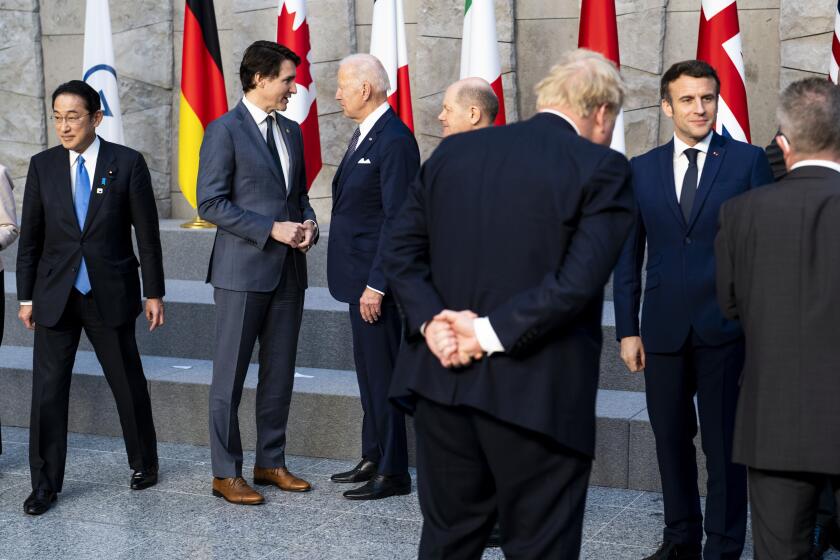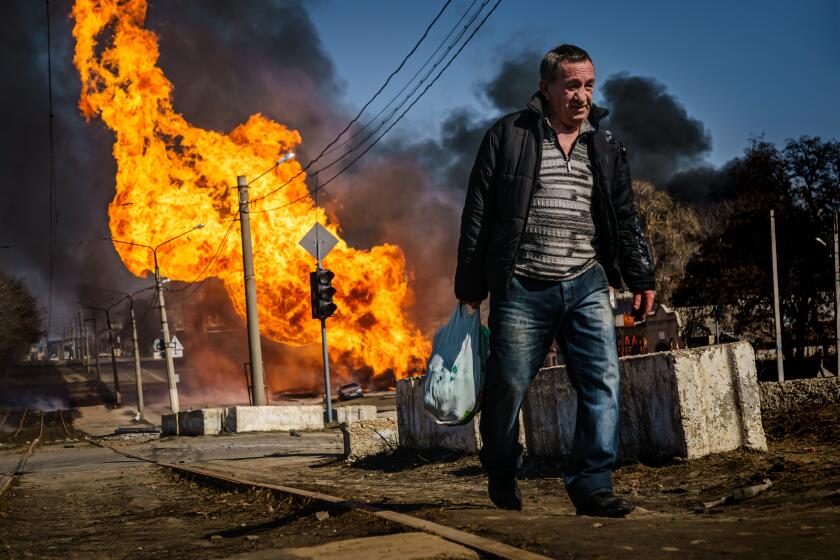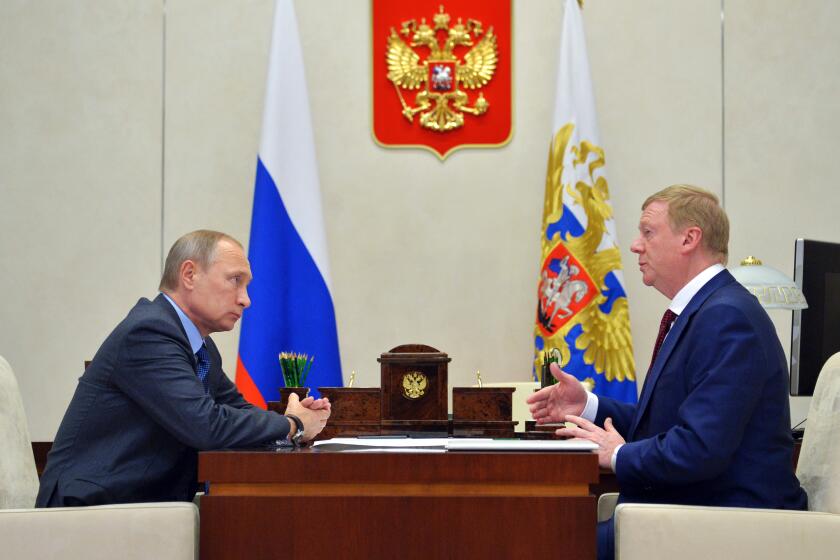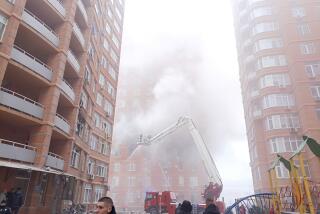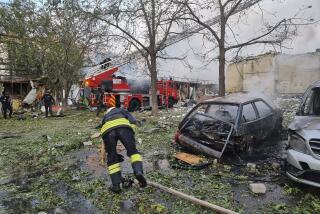As U.S. seeks to clarify Biden’s condemnation of Putin, Russia keeps up attacks across Ukraine
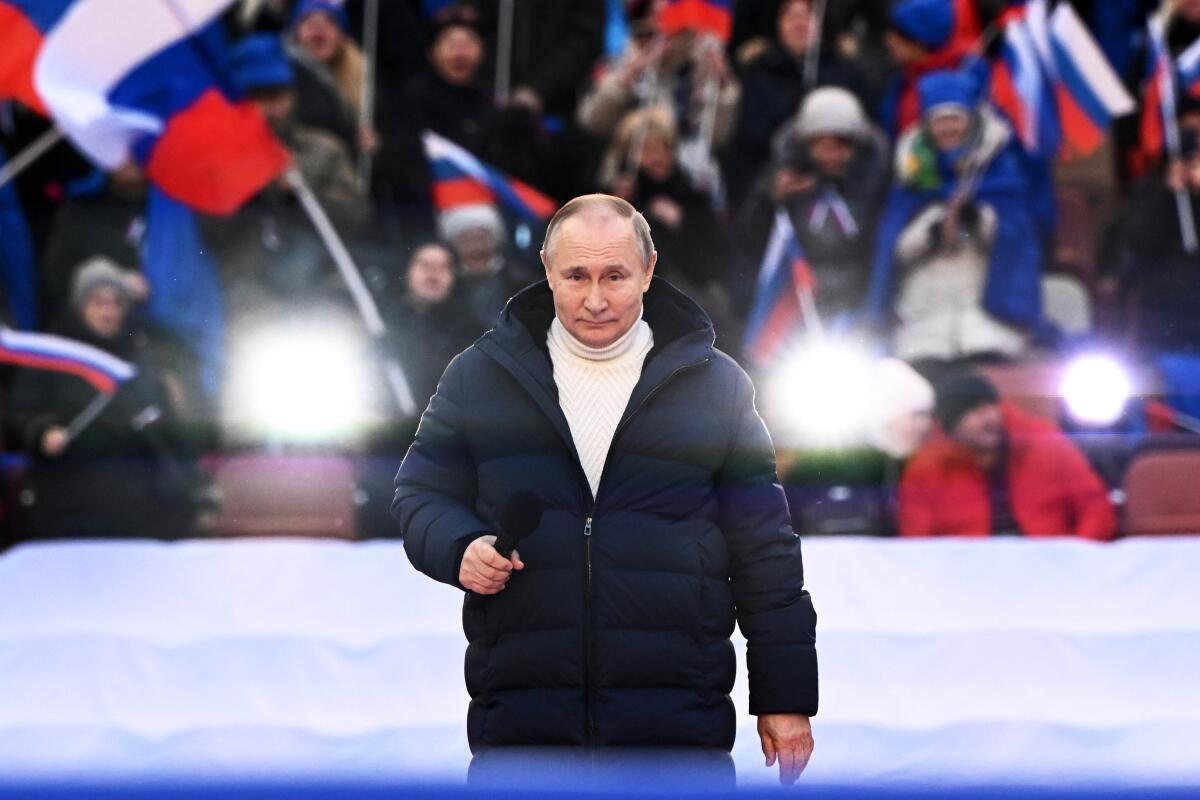
- Share via
LVIV, Ukraine — As fighting raged across Ukraine and one of the country’s top military leaders warned that Russian forces may seek to split the nation in two, U.S. officials scrambled Sunday to clarify President Biden’s off-the-cuff condemnation of Russian President Vladimir Putin a day earlier, saying regime change in Moscow is not on Washington’s agenda.
Biden’s dramatic declaration Saturday — “For God’s sake, this man cannot remain in power,” a reference to Putin — has prompted a frantic effort to walk back what appeared to be a White House endorsement of pushing the Russian leader out of office.
For the record:
11:26 p.m. March 27, 2022An earlier version of this story misspelled the name of U.S. Secretary of State Antony J. Blinken as Anthony.
“We do not have a strategy of regime change in Russia, or anywhere else, for that matter,” Secretary of State Antony J. Blinken told reporters in Jerusalem on Sunday.
Later, asked by a journalist in Washington whether he was calling for the removal of Putin, Biden replied “no.”
Biden’s remarks at the end of a rousing, pro-Ukraine speech in Warsaw, where he also described Putin as a “butcher,” prompted an outpouring of criticism at a moment when some fear the Russian invasion could escalate into a larger, even more catastrophic conflict. Now in its second month, the war has turned into a grinding ordeal as Russian forces continue to besiege the north and south of Ukraine while counteroffensives have pushed Russian soldiers back from advancing on the capital, Kyiv.
The fighting has displaced more than 10 million people, almost one-quarter of Ukraine’s population, and has pushed more than 3.7 million refugees out of the country, according to the United Nations. A recent report from the Kyiv School of Economics estimates $63 billion in damage to the nation’s schools, homes and other infrastructure since Putin launched his invasion in late February.
Biden’s comments “made a difficult situation more difficult and a dangerous situation more dangerous,” Richard Haass, a veteran U.S. diplomat and chairman of the New York-based Council on Foreign Relations, wrote on Twitter. French President Emmanuel Macron, meanwhile, warned against verbal “escalation” with Moscow.
The U.S. and its allies need to think about long-term security guarantees for Ukraine. They’ll be needed in any deal.
The concern is that Biden’s remarks played into Putin’s worldview that the West — with its NATO expansion and economic sanctions — wants to destroy Russia.
But in a sign of the politically delicate position he finds himself in, Biden on Sunday also faced criticism from Ukrainian President Volodymyr Zelensky, who knocked him and other Western leaders for lacking the courage to commit fighter jets and tanks to Ukraine out of fear that it could lead to a wider war.
Ukraine, Zelensky said in a video address, has asked the North Atlantic Treaty Organization and its allies for weaponry to help repel Russian forces but Western leaders have repeatedly equivocated.
What had been a thriving metropolis of nearly 1.5 million people, Kharkiv, remains in Ukrainian hands, but at an enormous cost.
“Ukraine cannot shoot down Russian missiles using shotguns, machine guns,” Zelensky said in a speech early Sunday in which he also alluded to the besieged southeastern city of Mariupol, where images of shell-battered apartment towers, hospitals and shopping centers have come to epitomize the destruction wrought by the war.
“I’ve talked to the defenders of Mariupol today. I’m in constant contact with them. Their determination, heroism and firmness are astonishing,” Zelensky said. “If only those who have been thinking for 31 days on how to hand over dozens of jets and tanks had 1% of their courage.” In an interview with the Economist published Sunday, he said many world leaders “are afraid of Russia.”
In his video address, Zelensky said that the war — which Putin has said was launched in part to protect Ukrainians with “blood ties” to Russia — was having the opposite effect: stigmatizing a language that has long existed alongside Ukrainian as a native tongue for many Ukrainians, especially in the east and south.
“Russia itself is doing everything to ensure that de-Russification takes place on the territory of our state,” Zelensky said.
In recent days, Russia has said that it is focused now on consolidating gains in the contested Donbas region, home to two pro-Moscow breakaway republics.
Kyrylo Budanov, the head of Ukrainian military intelligence, said that Russia’s goal may be to split Ukraine in two, like North and South Korea.
“The occupiers will try to pull the occupied territories into a single quasi-state structure and pit it against independent Ukraine,” Budanov said, although he predicted that guerrilla warfare by Ukrainians would derail such plans.
Leonid Pasechnik, the leader of the self-proclaimed Luhansk People’s Republic in the Donbas, said Sunday that he may hold a referendum on his territory becoming part of Russia.
“I think that in the near future a referendum will be held on the territory of the republic, during which the people will ... express their opinion on joining the Russian Federation,” Pasechnik said, according to Russian-state media organization Tass and other outlets.
Britain’s Defense Ministry said Russian forces appear to be attempting to encircle Ukrainian forces arrayed against pro-Russia separatist fighters in that region. Zelensky told the Economist that Russia has blocked the flow of Ukrainian supplies to wide swaths of the country’s southeast, where invading forces have kidnapped and in some cases killed the mayors of multiple cities.
Still, fighting and shelling have continued in other parts of the country.
Russian troops Sunday continued battling for control of several key urban centers, including Kharkiv in the northeast and Mariupol in the south. In the village of Oskil, outside Kharkiv, shelling killed seven people, including two children, according to local officials.
Mariupol Mayor Vadym Boychenko said on the messaging app Telegram that although Russian forces have entered his city, Mariupol remains “under the control of Ukrainian armed forces.”
“There is a Ukrainian flag flying over the city,” he said.
Ukrainian forces have put up stiff resistance in other urban areas, including in Kyiv. Ukrainian military officials said Sunday that some Russian troops had been withdrawn to regroup in Belarus, a Moscow-friendly country 60 miles north of Kyiv.
The western city of Lviv, a hub for the war-displaced multitudes that has otherwise been largely spared from the war, was hit Saturday afternoon by a pair of Russian airstrikes. Many residents speculated that the volley of missiles, which hit a fuel depot and a military installation, was intended as a message to Biden, who was in nearby Poland when the attacks occurred.
“With these strikes the aggressor wants to say, ‘Hello,’ to President Biden,” Andriy Sadovyi, Lviv’s mayor, said late Saturday.
Anatoly Chubais’ resignation as Moscow’s envoy on sustainable development was not the first by a Russian official over the war with Ukraine.
No one was killed in the two strikes in Lviv, authorities said, despite the proximity of residential districts to the targets. Both volleys appeared to hit their objectives with precision.
Lviv appeared calm Sunday as people attended church services, stopped at busy cafes and restaurants, and strolled in the streets of the cobblestoned historic center. But the attacks were another reminder that the war was not just isolated to the embattled environs of Kyiv, about 300 miles to the east, and to beleaguered cities in the faraway south, east and north.
“Of course it makes one nervous — this conflict is not a video game any more,” said Borys Babelashvili, 59, a shop owner who was walking his dog in the esplanade facing the city’s 19th century opera house. “It’s natural to be worried. But one has to go on with one’s life.”
Nearby, two displaced families from the war-battered city of Kharkiv, Ukraine’s second-most populous after Kyiv, said they heard about the strikes after arriving here by train late Saturday. That Lviv was now in the crosshairs of Russian cruise missiles wasn’t a welcome development. They had already experienced too many air and artillery attacks in Kharkiv.
“I hope the war is not following us here,” said Natasha Barsukova, 17, who was traveling with two siblings and her mother. “No, we don’t feel safe in Lviv either. We are moving on.”
The two families — two women and four children — were planning to leave the next day for Duesseldorf, Germany.
Still remaining in Kharkiv are the children’s fathers who, as military-aged men, are barred from leaving the country. Such separations are the norm in Ukraine now, as men bid goodbye to departing friends and family members who daily escape besieged areas on foot, and in cars, buses and trains for the relative safety in the country’s west and beyond.
McDonnell reported from Lviv and Linthicum from Mexico City. Times staff writer Tracy Wilkinson in Washington contributed to this report.
More to Read
Sign up for Essential California
The most important California stories and recommendations in your inbox every morning.
You may occasionally receive promotional content from the Los Angeles Times.
